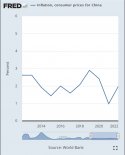I think these figures are already inflation-adjusted if they are "real wage growth".So in India wage growth essentially got wiped out by inflation?
You are using an out of date browser. It may not display this or other websites correctly.
You should upgrade or use an alternative browser.
You should upgrade or use an alternative browser.
Chinese Economics Thread
- Thread starter Norfolk
- Start date
You are absolutely right.I think these figures are already inflation-adjusted if they are "real wage growth".
I think Michael Pettis gets an unfairly bad rep sometimes, but I just can't defend him when he's posting really dumb stuff like his attacks on Chineve NEVs. A good Twitter thread taking him down.
P.S. Deflation is bad if it is prolonged and it's silly to pretend otherwise. However, Chinese core inflation is still positive so the aggregate CPI measure being in deflationary territory is mostly a function of food and energy costs going down (which is a good thing). I think we should look at core inflation as our primary metric.
P.P.S. Economic "complexity" rankings are very flawed. The best measure of productivity is nominal wages - with exceptions made for petrostates. China's highly competitive export sector in manufacturing is impressive, but it's really the service sector which is low-productivity, hence the relatively low wages. This is a problem in many other East Asian countries (e.g. South Korea). Too little attention is paid in East Asia to the service sector and this is also reflected in this thread. Manufacturing as a percent of GDP is just 28% in China's case (which is still fairly high by Western standards). If you want to raise the overall wage levels in the economy, you have to focus more on the 72% that isn't manufacturing.
Agreed on core inflation minus food and energy.
Prolonged is the key term when it comes to deflation (steady or decreasing prices.)
Even if core inflation goes down and that can happen with the big expansion in manufacturing (funding re-directed from real estate) along with productivity gains, it shouldn't be an issue. China has to build up fully domestic capacity as opposed to the foreign one in country because of the current geopolitical situation. There will be redundancy, inefficiency and oversupply in certain industries (ie autos) until things fully shakes out. (Fully shaking out could mean a lot of foreign and joint ventures giving up the market.)
Also Chinese inflation has been low in the modern era. Inflation is between one and three percent in the past decade. It doesn't take a whole lot to fall into "deflation" when you are hovering around 1% half the time:

As far as services are concerned, for better or worse China (along with the rest of East Asia) has decided long ago that industry is the base that supports services. This has worked out pretty well compared to India or the Philippines -- developing countries that are services first. The idea is one job in industry such as autos leads to 10 jobs in services.
I think these figures are already inflation-adjusted if they are "real wage growth".
Perhaps. But there are a lot of signs that the Indian population as a whole -- not the privileged lot in back-office and IT that draws their salary from the West -- is having a hard time increasing their quality of life. A large portion of their population literally cannot afford food on their income.
One of the bigger red flags is their ranking on the hunger index:
In the 2023 Global Hunger Index, India ranks 111th out of the .
If your income is actually increasing faster than inflation, you should be nowhere near the bottom on food security. You should have money to buy food if nothing else.
supercat
Colonel
Chinese EVs haven't really flooded the rest of the world, especially the European market, yet. One of the major reasons this hasn't happened was because in the rest of the world, demand for EVs were not nearly as high as in China. Pettis is accusing China of "pre-crime".I think Michael Pettis gets an unfairly bad rep sometimes, but I just can't defend him when he's posting really dumb stuff like his attacks on Chineve NEVs. A good Twitter thread taking him down.
I don't think productivity is a problem. To boost consumption, China can invest more in healthcare and retirement benefits.In your opinion, what steps should be taken to boost productivity in the service sector?
China has a market share of 49% in car sales in Russia last year.
South Korea posted a trade deficit with China for the first time in 31 years.
If China really wants to boost consumption they can do like Russia and Japan did some years ago. i.e. give people money for scrappage of cars or buying new appliances. But I scarcely think this is a good idea. Maybe a scrappage payout for cars would make sense once EV production ramps up further to reduce oil imports.
If China really wants to boost consumption they can do like Russia and Japan did some years ago. i.e. give people money for scrappage of cars or buying new appliances. But I scarcely think this is a good idea. Maybe a scrappage payout for cars would make sense once EV production ramps up further to reduce oil imports.
If they allow the resumption of bitcoin mining, private tuition and unrestricted gaming, that would boost consumption immediately.
Even core inflation is somewhat misleading. Core inflation excludes food and energy costs but still includes housing costs. We know the PRC government has been actively trying to bring down housing costs and deflate the real estate bubble. If housing costs are also excluded, the inflation numbers would look even healthier.P.S. Deflation is bad if it is prolonged and it's silly to pretend otherwise. However, Chinese core inflation is still positive so the aggregate CPI measure being in deflationary territory is mostly a function of food and energy costs going down (which is a good thing). I think we should look at core inflation as our primary metric.
Here's a breakdown of Chinese CPI components for December 2023.

Li Qiang says China’s economy grew an ‘estimated’ 5.2% in 2023
China’s economy grew an “estimated” 5.2 per cent last year, beating the official target, the country’s number two leader Premier Li Qiang said in Davos as he sought to allay concerns over its recovery from the Covid-19 pandemic.China's GDP grew 5.2% in 2023, which was boosted by an artificially low base due to Covid lockdowns in 2022, when GDP grew only 3%. On a two-year smoothed basis, growth for 2022 and 2023 was 4.2%, which is nothing close to what China achieved in the 40 years before, but still higher than the World Bank estimates for global growth (3.1%-3.2%), U.S. growth (about 2.4% compounded), E.U. growth (about 2.1% compounded), or Japanese growth (about 1.5% compounded) during that period. If growth can accelerate to 5%, that would be nice.
China also released statistics on youth unemployment (age 16-24) excluding students, which is 14.9%. The rate for the U.S. of the same age group is 9.4%. This is still unacceptably high.

